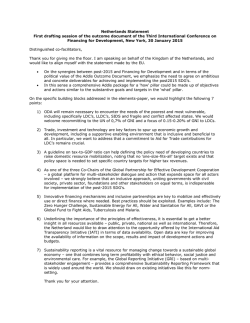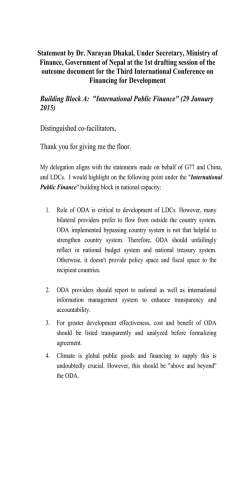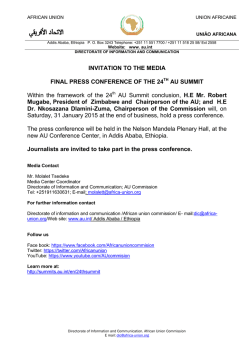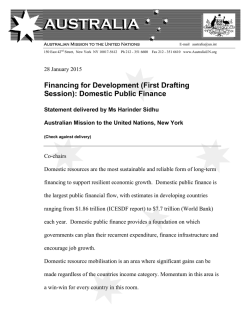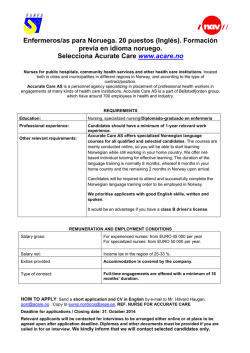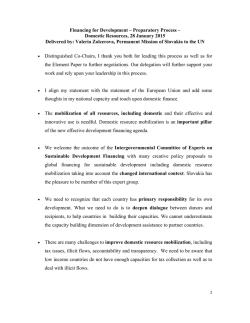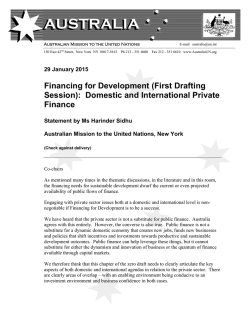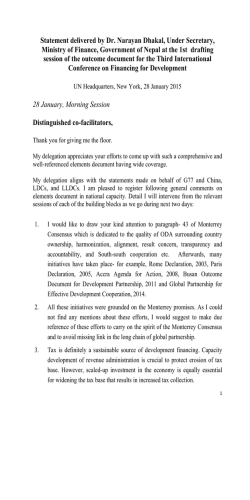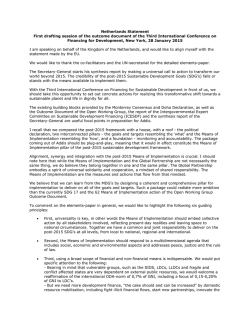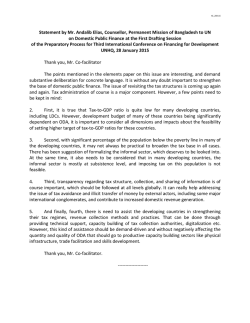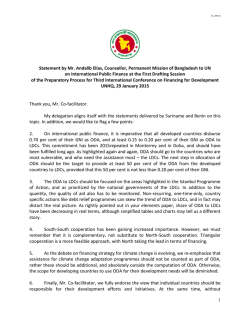
Co-facilitators, Let me join others in thanking you – and the
Financing for Development. Statement by Norway 28 January 2015 Co-facilitators, Let me join others in thanking you – and the Secretariat – for presenting us with a good starting point for the final leg towards Addis Ababa. Norway is pleased to note that the Elements Paper provides a holistic, ambitious and transformative approach to the matters at hand. It takes into account not only the need to look at all financial flows, but also how to ensure an environment that enables these flows to be released for development and spent in the most efficient way. The paper reminds us that all dimensions of sustainable development must be clearly reflected throughout a broad spectrum of critical issues. And it points to the need to, in concrete terms, clearly support and complement the SDG process. In particular, Norway is pleased to note the recognition in the paper of the need to maintain gender sensitivity throughout the process. 2015 is seen as a landmark year, and expectations are high. Norway would like to contribute to making Addis an important stepping stone towards both the SDG high level meeting and COP21. As stated by State Minister Dekeste of Ethiopia: This is an opportinity that should not be missed. Tackling these challenges ahead will require us to keep an open mind to all proposals aimed at mobilizing resources for sustainable development, and securing that funds be spent efficiently within transparent, participatory and accountable governance frameworks. Co-facilitators, I would like to comment briefly on three specific headlines from the Elements Paper, and one that is not there: Firstly, Addis Ababa offers an opportunity for countries with ODA commitments to re-confirm them, and also to welcome other countries to join in and pledge their support for sustainable development financing. Norway notes that there seems to be a broad recognition of the critical role of ODA, in particular for the poorest and most fragile states. We would therefore like to see a larger share of ODA going to the least developed and most fragile countries. And, not least importantly, we would like to see an increased emphazis on ODA being spent in a cathalytic way to leverage funds from other sources. Financing for Development. Statement by Norway 28 January 2015 On this background, Norway stands ready to re-confirm our commitment to continue to spend at least 0.7% of our GNI on international development. Secondly, the Addis Ababa conference is an opportunity to boost domestic resource mobilization as the most sustainable and predictable source of public financing for development. Norway welcomes the references in the Elements Paper to increase tax collection and reduce illicit financial flows in developing countries. As pointed out, good governance is essential to achieving sustainable development. Norway regardsransparency and public participation as cornerstones of effective and accountable resource mobilization, allocation and spending. But also international cooperation is necessary in order for developing countries to reach their full potential with regard to resource mobilization. Thirdly, co-facilitators, Norway would like to highlight the important role that international domestic and private finance play in support of sustainable development. Business development and job creation are important drivers for economic growth and poverty reduction. The Elements Paper provides a good basis for concrete recommendations from Addis Ababa, including an important reference to the UN Guiding Principles. It also raises the potential for financing socio-economic development by reducing tranaction costs on remittances. Finally, co-facilitators, Norway notes that even though the Elements Paper addresses the need for synegies between ODA and climate finance, it does not invite guidance on how private and public flows should all aim facilitate a climate-friendly, low-emission and inclusive economy. Issues for consideration in this regard should include stimulating carbon pricing and international initiatives to phase out fossil fuel subsidies. Thank you.
© Copyright 2026
